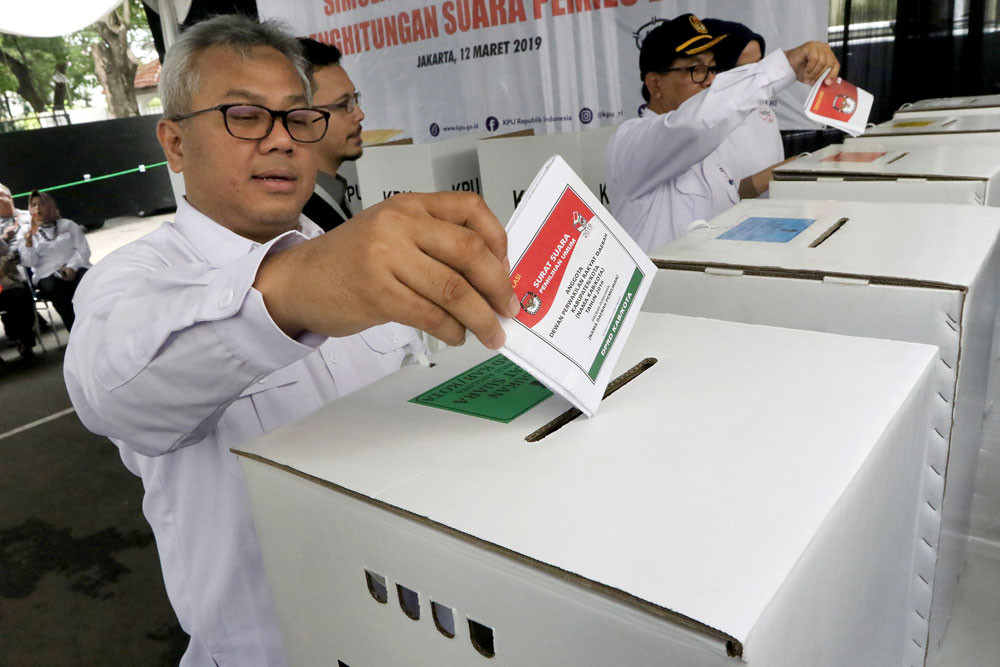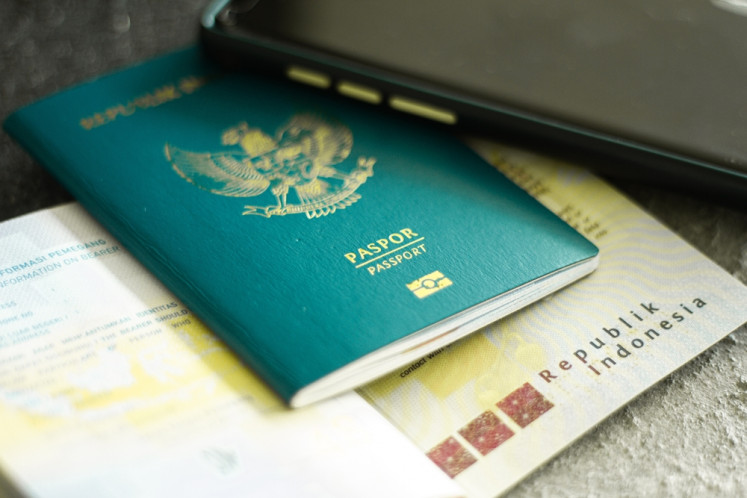What you need to know to vote on April 17
Change Size
 General Elections Commission (KPU) chairman Arief Budiman (left) casts a ballot during a mock voting day at the KPU compound in Jakarta. The simulation was held to familiarize voters with the voting process, slated for April 17. (The Jakarta Post/Dhoni Setiawan)
General Elections Commission (KPU) chairman Arief Budiman (left) casts a ballot during a mock voting day at the KPU compound in Jakarta. The simulation was held to familiarize voters with the voting process, slated for April 17. (The Jakarta Post/Dhoni Setiawan)
W
ith the concurrent presidential and legislative elections only days away, here is all you need to know to exercise your right to vote for the country’s leaders and representatives for the next five years.
When is it?
Election day for domestic voters is on Wednesday, April 17 and the polls will open at 7 a.m. and close at 1 p.m.
Voters who arrive at the polling station before 1 p.m. are guaranteed the opportunity to vote, including after the polls close.
Election day falls just before Easter weekend, with Good Friday falling on April 19 this year.
General Elections Commission (KPU) branches in Christian-majority regions have expressed concern that the timing of election day will make it harder for the commission to reach its target voter turnout of 77.5 percent.
“We urge all residents of NTT [East Nusa Tenggara] to vote first on April 17 before starting the Easter holiday,” NTT KPU head Ulbadus Gogi said recently as quoted by Antara.
Overseas voters, meanwhile, will cast their votes between April 8 and 14, depending on the country. Their votes will remain uncounted until the polls close on April 17.
Where can you vote?
The KPU officially finalized the final voter list (DPT) for the elections in December with 192,838,520 people on the voter rolls.
The 192.8 million consists of 190.8 million domestic voters and 2 million overseas voters, an increase of about 2 million from the final voter list of the 2014 general election.
There will be 809,500 polling stations across 34 provinces with an additional 783 overseas polling stations located in 130 Indonesian embassies and consulates around the world.
Voters can check which polling station they are registered with by accessing the KPU’s website infopemilu.kpu.go.id (https://infopemilu.kpu.go.id/pilpres2019/pemilih/cari-pemilih) and entering their full name and identity card number.
Voters are also able to cast their vote at polling stations other than the ones they are registered with by reporting to the local KPU office and requesting an A5 form. This must be done at least 30 days before election day.
Citizens aged 17 and above who are not registered on the DPT can still vote as long as they can produce their e-ID card at a polling station. These voters will be added to the special voter list and will be allowed to vote between 12 and 1 p.m. on voting day, provided that the polling station has enough ballots left.
Overseas voters have three different voting methods available: visiting a polling station, voting by mail or casting their votes at roving ballot or drop boxes. Such boxes will be distributed at locations where many Indonesian citizens gather, such as factories.
Who will you be able to vote for?
The simultaneous elections mean that voters will have five separate ballots to complete in the voting booth: one for the presidential and vice-presidential election, one for the House of Representatives, one for the Regional Representatives Council (DPD), one for the provincial-level Regional Legislative Council (DPRD) and one for the regency or municipal-level DPRD. Jakarta residents will only vote for the provincial-level council because the capital city does not have a regency or municipal-level council.
These changes, however, depend on which polling station the voter casts their vote at. Voters will receive all five ballots if they are voting at the polling station where they are registered. According to the final regulation issued by the KPU, voters who vote outside their registered electoral district will only be able to vote in the presidential election.
Overseas voters, meanwhile, will only receive two ballots, regardless of where they are voting: one for the presidential elections and one for the House.
All 2 million overseas voters are counted as members of the Jakarta II electoral district that also includes Central Jakarta and South Jakarta. There are seven House seats up for grabs in the district, with several high-profile names contesting the area, including former People’s Consultative Assembly speaker Hidayat Nur Wahid, Indonesian Democratic Party of Struggle (PDI-P) executive Eriko Sotarduga and Indonesian Solidarity Party (PSI) notable Tsamara Amany.
How will the votes be counted?
The votes will be counted in the following order: presidential ballots, House ballots, DPD ballots, provincial-level DPRD ballots and finally regency or municipal-level DPRD ballots.
Vote-counting will commence after polls close and all voters at polling stations have cast their ballots. According to the 2017 General Elections Law, votes must be counted on the same day that they are cast.
Vote-counting simulations organized by the KPU in Bogor, West Java and Tangerang, Banten last year were completed by 11:45 p.m.
After the votes are counted at each polling station, they will be recapitulated at the district, regency, provincial and national level. The KPU targets to complete the official nationwide vote count five days after the election at the latest.









